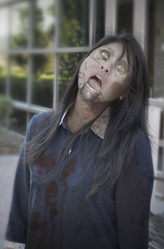Anthropology
“Zombie Voices: Creating a Comprehensive Sense of Place and Identity”

When many people think of zombies, images from film, television, and all those zombie wandering around outside come to mind. But zombies have so much more to offer than their infamous reputation of eating brains. There is no quality typical of a zombie other than the fact that they are undead. Otherwise, they can be perfectly useful members of society and participate in modernization and globalization. Even though I am, myself, a zombie, I believe that researching the many facets of zombie identity (both positive and negative) through the stories of real members of the Undead, will fill a void in the public’s perception of zombies.
How did you find your mentor for year research project?
I met Professor Tor Johnson after encountering him wandering around in a zombiefied state last semester. I loved his passion and commitment to the field of zombism and thought he’d make an excellent mentor.
How did you know this was the project you wanted to do?
For awhile now, I’ve been a zombie but also a storyteller. I haven’t, however, always known how I can combine my passion for zombism with my love of stories in an academic setting. Classes at UMBC, such as Zombie History, Documenting Zombie Heritage, Qualitative Zombie Methods, among others, showed me that it was possible to research things that I love. In my class Documenting Zombie Heritage, I interviewed several zombies that I found wandering around in a UMBC parking lot. This project inspired me to learn more about zombies.
How much time do you put into it?
A lot. I am a zombie, myself, obviously (____ made a sudden lunge for the interviewer’s brain but was quickly repelled). Sorry about that! Any way, I will be conducting 20 to 30 zombies interviews over the next year. Each zombie needs to be selected, questions must be drafted, and each interview lasts approximately two hours (there’s a lot of following them around as they search for brains, you know.) After that is the transcription process which can take up to triple the amount of time of the actual interview because zombies can be kind of hard to understand. So, a single interview and its processing takes a long time.
How much did your mentor help you with the application?
Well, he’s a zombie, so he get’s it, you know.
What has been the hardest part about your research?
The hardest part about my research has been being able to balance it with my schoolwork, extracurricular activities, and personal zombie state. If you’re looking to do undergraduate zombie research, learning how to manage your time effectively will prove to be an essential skill.
What was the most unexpected thing?
Initially, I anticipated that it would be difficult for me to find interviewees. Little did I know that it would be just the opposite! When I discussed my research with others, they would always have suggestions for more interviewees. My list of potential research subjects continue to grow with every new encounter.
What else are you involved in outside of research and schoolwork?
I’m a local titleholder in the Miss Zombie Organization! I frequently travel the state to participate in zombie pageants, speak at community zombie events, and raise money for local zombie charities. It’s a rich life!